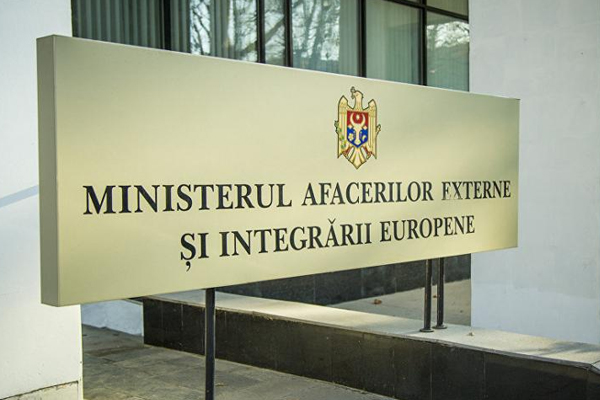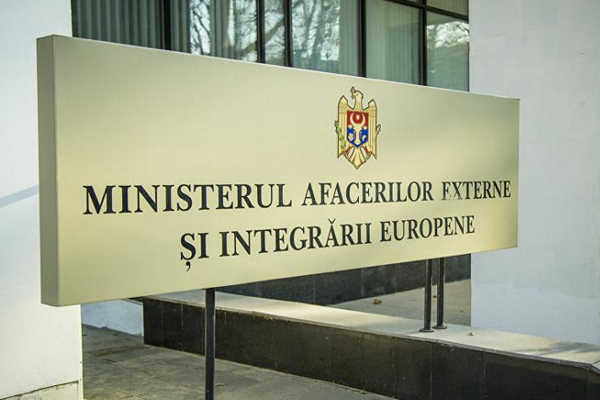Moldova Expels Russian Diplomats Amid Espionage Allegations!
Moldovan Foreign Ministry Declares Russian Embassy Employees Personae Non Gratae
In a significant diplomatic move, the Moldovan Foreign Ministry has declared three employees of the Russian Embassy in Chisinau as personae non gratae. This decision, which has garnered considerable attention, reportedly stems from allegations of espionage activities linked to these embassy staff members. The announcement was made public via a tweet from NEXTA, a news outlet known for its coverage of Eastern European affairs.
Understanding the Context of the Declaration
The term "persona non grata," which translates to "unwelcome person," is often used in diplomatic contexts to describe foreign diplomats or officials who have engaged in activities that are not in line with their diplomatic missions or have violated the host country’s laws. By declaring these Russian diplomats as personae non gratae, Moldova is taking a firm stance against perceived threats to its national security.
Allegations of Espionage
While the Moldovan government has not disclosed specific details regarding the alleged espionage activities, the move aligns with a broader trend in Eastern Europe where nations are increasingly vigilant about foreign influence and intelligence operations. Moldova, a country that has historically had close ties with Russia, has been reassessing its foreign relations in light of recent geopolitical developments, particularly the ongoing conflict in Ukraine and Russia’s actions in the region.
The Impact on Moldova-Russia Relations
This decision is likely to strain relations between Moldova and Russia further. Moldova has been navigating a complex geopolitical landscape, balancing its ties with the European Union and NATO while managing its historical and cultural connections with Russia. The expulsion of Russian diplomats could be seen as a signal to both domestic and international audiences that Moldova is committed to safeguarding its sovereignty and security.
- YOU MAY ALSO LIKE TO WATCH THIS TRENDING STORY ON YOUTUBE. Waverly Hills Hospital's Horror Story: The Most Haunted Room 502
Regional Implications
The expulsion of Russian diplomats is not an isolated incident but part of a larger pattern in Eastern Europe. Countries such as Poland, the Baltic states, and Ukraine have similarly taken measures against Russian diplomats accused of espionage or subversive activities. This trend reflects growing concerns about Russia’s influence in the region and the potential for destabilizing actions that could undermine national security.
Responses from Russia
In response to the expulsion of its embassy staff, the Russian government may retaliate by declaring Moldovan diplomats in Moscow as personae non gratae as well. Such reciprocal actions are common in diplomatic disputes and could lead to further escalation in tensions between the two countries. Russia has historically reacted strongly to perceived slights against its diplomatic missions, and Moldova’s actions could provoke a significant response.
Domestic Reactions in Moldova
Domestically, the decision to expel Russian diplomats may be met with mixed reactions. While some segments of the population may support a firmer stance against Russia, others may view this action as a provocation that could lead to instability in an already fragile region. The Moldovan government must navigate these domestic sentiments carefully, balancing national security concerns with the need for political stability.
The Importance of Intelligence and Security
The allegations of espionage highlight the critical importance of intelligence and security in today’s geopolitical climate. Countries worldwide are increasingly aware of the threats posed by foreign intelligence operations, which can undermine national interests and security. Moldova’s decision to expel Russian diplomats underscores the need for vigilance and proactive measures in protecting national sovereignty.
Future Outlook
The future of Moldova-Russia relations remains uncertain in the wake of this diplomatic incident. As Moldova continues to assert its independence and align more closely with Western institutions, it may face increasing challenges from Russia, which seeks to maintain its influence in the region. The Moldovan government will need to carefully consider its next steps, balancing diplomatic engagement with the need to protect its national interests.
As the situation develops, observers will be watching closely for any further actions from both Moldova and Russia. The implications of this diplomatic row extend beyond the two nations involved and could resonate throughout the region, affecting the broader geopolitical landscape in Eastern Europe.
Conclusion
The declaration of three Russian diplomats as personae non gratae by the Moldovan Foreign Ministry marks a significant moment in the country’s foreign relations. Linked to allegations of espionage, this decision reflects Moldova’s commitment to safeguarding its national security and sovereignty. As tensions rise between Moldova and Russia, the implications of this diplomatic move will be felt not only within the two countries but also across the broader Eastern European region.
In conclusion, the expulsion of Russian diplomats from Moldova is a critical event that underscores the shifting dynamics of international relations in Eastern Europe. With growing concerns over foreign influence and espionage, Moldova’s actions highlight the importance of national security and the need for countries to assert their sovereignty in an increasingly complex geopolitical environment.

The Moldovan Foreign Ministry has declared three employees of the Russian Embassy personae non gratae.
Reportedly, this is linked to espionage activities. pic.twitter.com/fRW3hMDu5V
— NEXTA (@nexta_tv) March 31, 2025
The Moldovan Foreign Ministry has declared three employees of the Russian Embassy personae non gratae
In a significant diplomatic move, the Moldovan Foreign Ministry has officially declared three employees of the Russian Embassy in Chișinău as personae non gratae. This decision comes amid rising tensions between Moldova and Russia, and it’s reportedly linked to espionage activities. The declaration means that these individuals must leave the country, signaling a clear stance by Moldova against perceived foreign interference.
The term “persona non grata” is used in diplomatic contexts to denote individuals who are not welcome in a particular country. This action is a serious diplomatic rebuke, reflecting deeper geopolitical issues and national security concerns that Moldova faces today. The Moldovan government has been increasingly vigilant regarding the activities of foreign diplomats, particularly those from Russia, as the region navigates complex relationships with larger powers.
Reportedly, this is linked to espionage activities
The accusation of espionage is particularly alarming. It raises questions about the level of foreign intelligence operations being conducted in Moldova and the broader implications for national security. Moldova, which has been striving to strengthen its ties with the European Union and NATO, finds itself in a precarious position, sandwiched between the West and Russia. These developments could have far-reaching consequences for Moldova’s international relations and internal stability.
Espionage is not a new phenomenon in international relations, but the intensity and visibility of such activities have increased in recent years. The Moldovan government’s decision to expel these embassy employees indicates a proactive approach to national security, aiming to protect its sovereignty and integrity from foreign interference. The situation highlights the ongoing struggle for power and influence in Eastern Europe, where countries like Moldova often find themselves navigating a complex geopolitical landscape.
The implications of declaring diplomats personae non gratae
Declaring diplomats as personae non gratae can lead to a series of repercussions. It not only results in the immediate expulsion of those individuals but could also strain diplomatic relations between the countries involved. In this case, the Russian government may respond with countermeasures, potentially expelling Moldovan diplomats from Moscow or taking other retaliatory actions.
Moreover, this incident may influence public opinion in both Moldova and Russia. In Moldova, citizens may rally behind government actions perceived as defending national interests, while in Russia, state media may use this as an opportunity to paint Moldova as hostile to Russian interests. The narrative around such events can significantly impact how citizens perceive their government and foreign relations.
Understanding the broader context of Moldova-Russia relations
To fully grasp the significance of this incident, we need to take a step back and look at the broader context of Moldova-Russia relations. Historically, Moldova has had a complicated relationship with Russia. After gaining independence from the Soviet Union in 1991, Moldova has oscillated between seeking closer ties with the West and maintaining relations with Russia.
The pro-European government elected in 2021 has sought to strengthen ties with the European Union, aiming for eventual EU membership. This shift has not sat well with Russia, which sees Moldova as part of its sphere of influence. Moscow’s support for the breakaway region of Transnistria, which is located in Moldova and has a significant Russian military presence, further complicates the relationship.
In this light, the Moldovan Foreign Ministry’s recent actions can be viewed as a response to an increasingly assertive Russia. The expulsion of Russian diplomats is a signal that Moldova is willing to take a stand against external pressures. However, this comes with risks, as Moldova must balance its foreign policy in a way that doesn’t provoke further aggression from Russia.
The impact on Moldova’s internal politics
The decision to declare the Russian diplomats personae non gratae also has implications for Moldova’s internal politics. The ruling party, which is pro-European, may see a boost in popularity for taking a firm stance against Russian influence. This could lead to increased support for their policies aimed at integrating Moldova further into European structures.
Conversely, opposition parties that favor stronger ties with Russia may capitalize on this situation to rally their base, arguing that the government is jeopardizing national security and stability. The political landscape in Moldova is highly polarized, and incidents like this can exacerbate divisions. The government’s ability to navigate these challenges will be critical as it seeks to maintain its pro-European agenda while managing domestic dissent.
Public reactions to the expulsion of Russian diplomats
Public reaction to the Moldovan Foreign Ministry’s decision has been mixed. Many citizens express support for the government’s actions, viewing them as a necessary step in asserting Moldova’s sovereignty. Social media platforms are abuzz with discussions about national pride and the need to protect the country from foreign espionage.
However, there are also voices of concern. Some worry that escalating tensions with Russia could lead to economic repercussions or even diplomatic isolation. Moldova relies on Russia for energy supplies, and any deterioration in relations could affect these crucial imports. This delicate balance of public opinion reflects the complexities of Moldovan society, where many still have familial and cultural ties to Russia.
Future prospects for Moldova’s foreign relations
Looking ahead, the situation presents both challenges and opportunities for Moldova. The government’s assertive stance against Russian espionage could galvanize support for its European integration efforts. However, it must also be cautious not to provoke unnecessary conflict with Russia, which could destabilize the already fragile situation in the region.
Strengthening ties with Western nations while managing relations with Russia will require skilled diplomacy. Moldova has the potential to play a unique role in the geopolitical landscape, serving as a bridge between East and West. How the government navigates these relationships will be crucial in shaping the future of Moldova.
In conclusion, the declaration of Russian diplomats as personae non gratae by the Moldovan Foreign Ministry is a significant development that underscores the complexities of international relations in Eastern Europe. With the specter of espionage looming large and the ongoing geopolitical tug-of-war, Moldova finds itself at a crossroads. The decisions made today will resonate for years to come, shaping not only Moldova’s future but also the broader dynamics of the region. As the situation unfolds, all eyes will remain on Moldova, watching how it manages its delicate balance between powerful neighboring influences.

